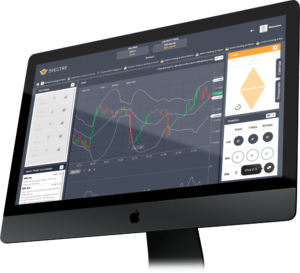How proper application of blockchain technology could change retail FX – Guest Editorial
FX industry senior executive Athol Nourse looks at how a distributed system which renders platforms ‘brokerless’ could counter what he considers to be an old era in which greed overcame most brokerages which led to a degree of tampering with price feeds, pay-out percentages and interfering with customer capital by trading their account to zero or even blocking withdrawals

Athol Nourse is a senior FX industry executive with over 17 years of experience, commencing his career as a stockbroker, before leading FxPro’s business development for Japan and Australia. He then became Global Head of Institutional business for Synergy FX in Sydney, before joining ThinkMarkets as General Manager in Melbourne. A position as Managing Director of ChampionFX ensued, leading to his founding of brokerless retail trading platform Spectre.ai which will go live on March 31 this year.
It was barely over a year ago that Canadian Entrepreneur, Fred Turbide, wrote a note to his wife, went into his garage and ended his life with a tragic self-inflicted gunshot wound to the head.
It turns out a Binary Options broker based in Israel had fleeced him of over $250,000 of his life savings. This was just the canary in the coal mine.
Today, the financial trading industry is mired with conflict of interest and fraud. Brokers have been long known to manipulate prices and even refuse withdrawals, thereby destroying retail trader balances and finances, over time.

This contributes to a shocking 70-90%+ industry loss ratio, meaning that more than 7/10 traders lose money in the longer run. At unregulated ‘bucket shop’ brokerages, the loss-ratios are even higher as they simply refuse to allow traders to withdraw profits.
Unlike random events such as dice-rolls or coin-flips, research into the financial markets (either through chart pattern technical analysis or macroeconomic analysis of the underlying asset’s fundamentals) can allow a trader to increase their odds of winning trades from just 50% to up to 80%, over time.
Owing to the simplicity of the digital options market, the potential ability to ‘beat the market’ through research and overall addictive nature of trading, growth in the digital and binary options market went hyperbolic during the 2008-2015 period, reaching a peak annual traded volume of $30bn.
Alas, greed overcame most brokerages and many now regularly tamper with price feeds, pay-out percentages and have often started to rob clients of their capital by trading their account to zero or even blocking withdrawals.
This problem is not ring- fenced to just digital options but also classic retail FX trading, where so called ‘B-Book’ brokerages directly trade against the client. Prominent examples of fraudulent activity in both, classic retail FX trading and digital options include Banc De Binary, a digital options broker that was ejected from the U.S for defrauding clients (and went on to shut down in 2017), FXCM, a major FX trading broker that, according to serious allegations from the National Futures Association, traded against clients whilst purporting to send all orders to a live market.
The annals of history display a range of others. All problems have a common genesis; namely the control of client funds and the fact that is rests solely with the broker.
Brokers have long failed to cope with centralisation risks that allow for moral hazard to enter the equation. Despite heavy fines and other measures, the situation has only worsened resulting in, one may argue, draconian measures being thought of by the ESMA as we move to a MIFID II world.
Such measures, which included a dramatic reduction in leverage for CFDs and expiry schedules for binary options, punish the contract type and financial innovation in the retail trading sector, rather than punishing the broker and actually using technology to disintermediate it.
SPECTRE, which is built on the Ethereum blockchain, removes the broker out of the picture entirely, thereby disrupting the current model and empowering the trader. SPECTRE’s aim is to disrupt the digital options and classic retail FX/equities trading industries and lead a paradigm shift.
From a technical standpoint, it is the world’s first broker-less financial trading platform with an embedded, decentralised liquidity pool. Like traditional trading, clients are trading against SPECTRE’s balance sheet (also known as the ‘liquidity pool’), however this pool is initially capitalised and owned by token-sale investors.
In other words, SPECTRE’s liquidity pool is owned by token holders who initially invest in the token-sale and therefore own a part of SPECTRE’s profitability, into perpetuity. Tokens are publicly traded on crypto-currency exchanges and thus can be held by anyone.
In this broker-less model, SPECTRE’s liquidity pool is decentralised and the conflict of interest problem is eradicated. The trading process at SPECTRE works as follows; the retail trader signs up to the website but deposits nothing. Instead they simply open a crypto-wallet on the website and send funds to that address (this process is verified and governed by the Ethereum blockchain and so, is trust-less and secure).
This offers them fraud-free trading with semi-decentralisation or for those who wish for total decentralisation, major off-site crypto-wallets can be connected to this wallet as well. This ensures that funds cannot be accessed or handled by SPECTRE employees or anyone apart from the trader him/herself.
Traders can trade Smart Options (with predetermined expiries) or, eventually, Smart CFDs with no expiries, but instead, stop losses and take profit levels. Both contract types are zero-leverage and linked to the blockchain, making SPECTRE a technology company, rather than a traditional broker.
SPECTRE’s liquidity pool is estimated at over $4,000,000 in size and therefore offers very high levels of 24 hour liquidity and counterparty positions to Smart Option and Smart CFD traders.
Transparency is paramount to SPECTRE and therefore traders can offer the state of the liquidity pool at all times. If trading from an off-site cryptocurrency wallet, there are no deposits or withdrawals, all balances are reconciled on a per trade basis, meaning full decentralisation. If trading from an onsite private-escrow smart contract, traders can automatically withdraw any gains (minus gas fee) every 24 hours without human intervention.
Does this mean SPECTRE doesn’t conduct KYC? Business development director comments “Absolutely not, SPECTRE conducts automated KYC with Jumio to ensure it is in compliance with AML, TF regulations and not accepting traders from restricting regions such as the United States.”
SPECTRE’s platform goes live on March 31st, 2018.
The subject matter and the content of this article are solely the views of the author. FinanceFeeds does not bear any legal responsibility for the content of this article and they do not reflect the viewpoint of FinanceFeeds or its editorial staff.









